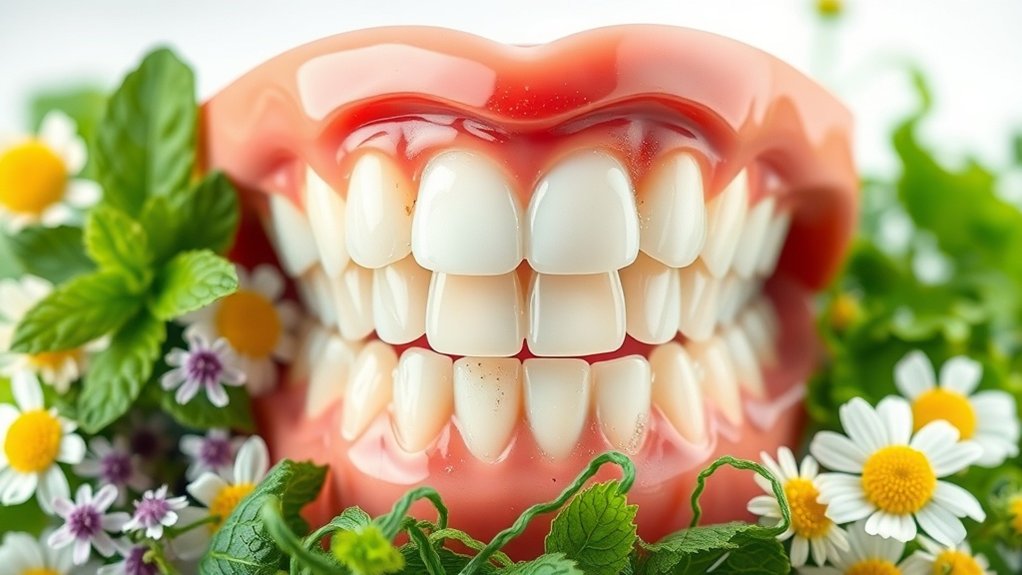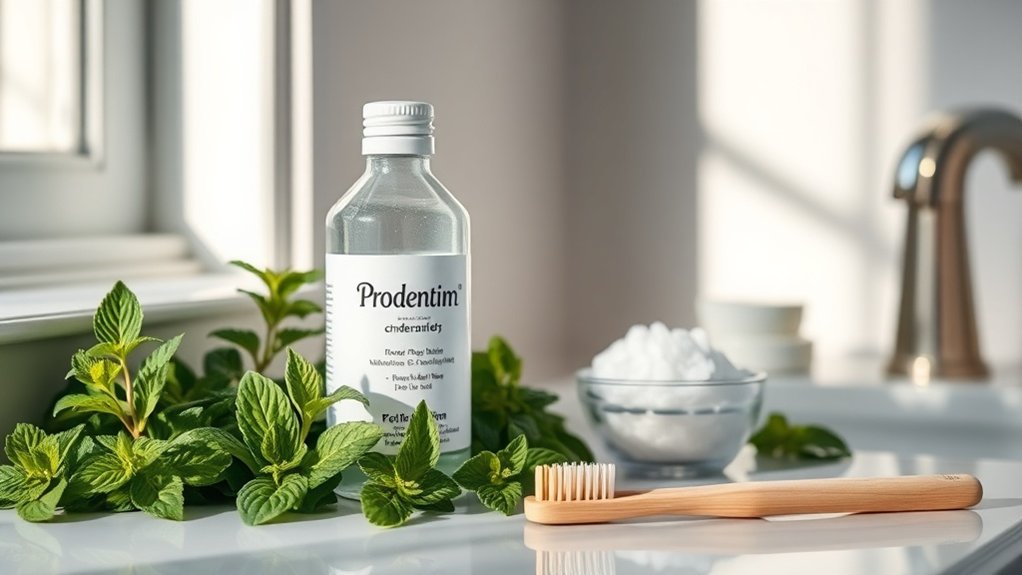If you’re looking for effective alternatives to Prodentim to tackle gum inflammation, consider natural remedies like probiotics, herbal rinses from chamomile and sage, or essential oils such as tea tree oil. Over-the-counter options like anti-inflammatory mouthwash and fluoride dental gels can also be beneficial. Don’t forget a balanced diet rich in vitamins C and D to support your gums. There’s plenty more you can explore to enhance your oral health and restore gum health.
Key Takeaways
- Natural remedies like probiotics and herbal rinses can effectively reduce gum inflammation and support oral health without relying on products like Prodentim.
- Essential oils, such as tea tree oil, provide antibacterial benefits and can soothe inflamed gums when used appropriately.
- Anti-inflammatory mouthwashes available over-the-counter can help reduce gum inflammation and eliminate harmful bacteria effectively.
- Maintaining a balanced diet rich in vitamins C and D supports gum health and can serve as an alternative to supplements like Prodentim.
- Regular dental check-ups and professional guidance ensure personalized treatment options are available for managing gum inflammation effectively.
Understanding Gum Inflammation: Causes and Symptoms
When you notice your gums feeling swollen or tender, it’s often a sign of inflammation that can stem from various causes. Poor oral health, including plaque buildup and gum disease, frequently triggers gum inflammation. Additionally, factors like hormonal changes, certain medications, and even stress can contribute to your symptoms. You might also experience bleeding when brushing or flossing, which signals you to take action. To combat gum inflammation, consider incorporating natural supplements into your routine. Ingredients like vitamin C, coenzyme Q10, and omega-3 fatty acids can support your gum health. Staying proactive about your oral hygiene and understanding these causes will help you maintain a healthier mouth and reduce inflammation effectively.
Natural Remedies for Gum Health
While maintaining good oral hygiene is essential, incorporating natural remedies can further enhance your gum health. One effective approach is using probiotics, which support healthy bacteria in your mouth and can reduce inflammation. Foods like yogurt or fermented vegetables are great sources. Additionally, herbal rinses, such as chamomile or sage, offer anti-inflammatory properties that soothe gum irritation. Don’t overlook the power of essential oils, like tea tree oil, which can promote gum health when diluted and used properly. Finally, maintaining a balanced diet rich in vitamins C and D provides crucial immune support, helping your body combat gum disease. By integrating these natural remedies for gum health, you can boost your overall oral wellness effectively.
Over-the-Counter Products That Help
Over-the-counter products can be a game-changer for your gum health. If you’re looking for alternatives to Prodentim, consider these effective dental care options:
- Anti-inflammatory mouthwashes: These can help reduce gum inflammation and kill harmful bacteria.
- Dental gels with fluoride: They strengthen enamel and promote overall gum health.
- Natural toothpaste with essential oils: Ingredients like tea tree oil or neem can soothe gums and provide antibacterial benefits.
Integrating these products into your daily routine can considerably improve your gum health. Remember, while over-the-counter solutions are helpful, it’s crucial to maintain regular dental check-ups for ideal care. With the right approach, you can take control of your gum health and enjoy a brighter smile!
The Role of Diet in Reducing Gum Inflammation
Diet plays a significant role in managing gum inflammation, often complementing the benefits of over-the-counter products. Incorporating specific nutrients can help reduce inflammation and promote healing.
| Food Source | Benefits |
|---|---|
| Coenzyme Q10 | Supports gum tissue health |
| Lactobacillus Reuteri | Enhances oral microbiome balance |
| Leafy Greens | Packed with vitamins and minerals |
| Omega-3 Fatty Acids | Reduces inflammation in the body |
Essential Oils for Oral Care
Essential oils have gained popularity as natural solutions for enhancing oral care, thanks to their antimicrobial and anti-inflammatory properties. You can easily incorporate these oils into your routine for healthier gums and invigorating breath. Here are three essential oils you should consider:
- Tea Tree Oil: Known for its powerful antibacterial effects, tea tree oil can help combat plaque and promote gum health.
- Peppermint Oil: With its refreshing scent, peppermint oil not only freshens breath but also has antibacterial properties that can reduce inflammation.
- Clove Oil: This oil is renowned for its analgesic effects and can provide relief from toothaches while supporting gum health.
Try using these oils in mouth rinses or diluted in carrier oils for effective oral care.
The Importance of Proper Oral Hygiene
Maintaining proper oral hygiene is essential for a healthy smile. You should establish a daily brushing routine and incorporate effective flossing techniques to keep plaque and bacteria at bay. By prioritizing these habits, you can greatly improve your overall oral health and prevent potential dental issues.
Daily Brushing Routine
A solid daily brushing routine is essential for keeping your teeth and gums healthy. Regular brushing helps remove plaque, prevents cavities, and reduces gum inflammation. To maximize your oral hygiene, follow these three simple steps:
- Brush Twice a Day: Aim for at least two minutes each time, using a fluoride toothpaste to strengthen enamel.
- Use the Right Technique: Hold your toothbrush at a 45-degree angle and use gentle circular motions to clean all surfaces of your teeth.
- Replace Your Toothbrush Regularly: Change it every three to four months, or sooner if the bristles are frayed.
Flossing Techniques Importance
While brushing your teeth is essential, it’s easy to overlook the importance of flossing in your oral hygiene routine. Flossing helps remove food particles and plaque from between your teeth, areas that your toothbrush can’t reach. By doing this, you greatly reduce the risk of gum disease and cavities. It’s recommended to floss at least once a day, preferably before brushing, to maximize your oral health benefits.
When you floss, use a gentle sawing motion and avoid snapping the floss into your gums. Proper technique matters; wrap the floss around each tooth in a “C” shape, ensuring you clean beneath the gumline. Consistent flossing not only keeps your mouth fresh but also contributes to overall health. Don’t skip it!
Lifestyle Changes to Support Gum Health
To support gum health effectively, incorporating specific lifestyle changes can make a significant difference. Here are three key adjustments you can make:
Incorporate these lifestyle changes to effectively support your gum health and enjoy a brighter smile.
- Balanced Diet: Eat plenty of fruits, vegetables, and whole grains while reducing sugary snacks. These foods provide essential nutrients that help maintain healthy gums.
- Stay Hydrated: Drink enough water throughout the day. Staying hydrated helps wash away food particles and bacteria, reducing the risk of gum inflammation.
- Regular Exercise: Engage in physical activity regularly. Exercise improves blood circulation, which is crucial for delivering nutrients to your gum tissue.
Herbal Supplements for Gum Inflammation
If you’re looking for natural ways to combat gum inflammation, herbal supplements can be a great addition to your oral care routine. Ingredients like turmeric and ginger contain powerful anti-inflammatory properties that can help soothe irritated gums. You might also consider using chamomile, known for its calming effects, which can aid in reducing inflammation. Another option is green tea, rich in antioxidants, which promotes oral health by fighting bacteria. Incorporating these herbs into your daily routine, whether through teas or capsules, can provide significant benefits. Always consult your healthcare provider before starting any new supplements to verify they’re right for you. By embracing these herbal options, you can enhance your gum health and overall well-being naturally.
Professional Treatments for Severe Cases
When you face severe gum issues, professional treatments can be vital for restoring your oral health. Options like scaling and root planing, laser gum therapy, and periodontal surgery can effectively address advanced conditions. Understanding these treatments will help you make informed decisions for your dental care.
Scaling and Root Planing
While daily brushing and flossing are essential for maintaining oral health, they often aren’t enough for individuals with severe gum disease. If you’re facing considerable gum issues, scaling and root planing might be the solution. This professional treatment involves two key steps:
- Scaling: Your dentist removes plaque and tartar from above and below the gum line, reducing inflammation.
- Root Planing: The roots of your teeth are smoothed, allowing gums to reattach and promote healing.
- Follow-Up Care: Regular check-ups and possibly additional cleanings guarantee lasting results.
These procedures can greatly improve gum health, alleviating pain and preventing further complications. If you’re dealing with severe gum disease, consider discussing scaling and root planing with your dentist for a healthier smile.
Laser Gum Therapy
Laser gum therapy offers a cutting-edge approach to treating severe gum disease, utilizing focused light energy to target infected tissue. This minimally invasive treatment helps reduce inflammation and promotes healing without the need for traditional surgical methods.
Here’s a quick comparison of laser therapy benefits:
| Benefits | Traditional Treatments |
|---|---|
| Faster recovery time | Longer recovery periods |
| Less discomfort | More pain and swelling |
| Precise targeting of tissue | Broader tissue impact |
| Reduced risk of infection | Higher infection risk |
If you’re struggling with gum issues, consult your dentist about laser gum therapy. This innovative option might be the relief you need, helping restore your oral health while minimizing downtime.
Periodontal Surgery Options
If you’re facing advanced gum disease and other treatments haven’t provided relief, periodontal surgery might be your best option. This professional intervention can help restore your gum health and prevent further complications. Here are three common surgical options to contemplate:
- Flap Surgery: Your dentist lifts the gums to remove tartar and bacteria, then repositions them for better fit against the teeth.
- Bone Grafting: If your jawbone is damaged, a graft can help regenerate bone and support your teeth.
- Guided Tissue Regeneration: This procedure encourages the growth of new bone and gum tissue, often used in conjunction with flap surgery.
Consult your periodontist to determine the right approach tailored to your specific needs.
Maintaining Healthy Gums Long-Term
To maintain healthy gums long-term, it’s essential to adopt a consistent oral care routine that goes beyond just brushing and flossing. Incorporate antimicrobial mouthwash to reduce bacteria and prevent plaque buildup. Make it a habit to schedule regular dental check-ups; these visits help catch any issues early. You should also pay attention to your diet—foods rich in vitamins C and D support gum health. Don’t forget to stay hydrated; water helps wash away food particles and keeps your mouth moist. Quitting smoking is vital, as it greatly impacts your gum health. Finally, manage stress, as it can lead to grinding teeth, which harms your gums. By following these steps, you’ll promote strong gums for years to come.
Frequently Asked Questions
Can Stress Contribute to Gum Inflammation?
Yes, stress can contribute to gum inflammation. It weakens your immune system, making you more susceptible to infections and inflammation. Managing stress through relaxation techniques can help maintain your gum health and overall well-being.
How Often Should I Visit the Dentist for Gum Health?
Like clockwork, you should visit the dentist every six months for ideal gum health. Regular check-ups help catch issues early, ensuring your gums stay healthy and preventing more serious problems down the line. Don’t skip them!
Are There Specific Foods That Worsen Gum Inflammation?
Yes, certain foods can worsen gum inflammation. Sugary snacks, acidic fruits, and overly processed items can irritate your gums. It’s best to limit these foods and focus on a balanced diet for better gum health.
Can Smoking Affect Gum Health?
Yes, smoking greatly harms gum health. It reduces blood flow, impairs healing, and increases the risk of gum disease. Isn’t it time to contemplate how your habits could be affecting your smile?
What Are the Signs of Gum Disease Progression?
You’ll notice signs like persistent bad breath, swollen gums, bleeding during brushing, receding gums, and loose teeth as gum disease progresses. Catching these symptoms early can help you prevent further complications and maintain oral health.
Conclusion
In summary, taking care of your gums is essential for your overall health. Did you know that nearly 50% of adults over 30 experience some form of gum disease? By exploring natural remedies, over-the-counter products, and making lifestyle changes, you can effectively combat gum inflammation without relying solely on brands like ProDentim. Prioritizing your gum health today not only keeps your smile bright but also enhances your well-being for years to come.





